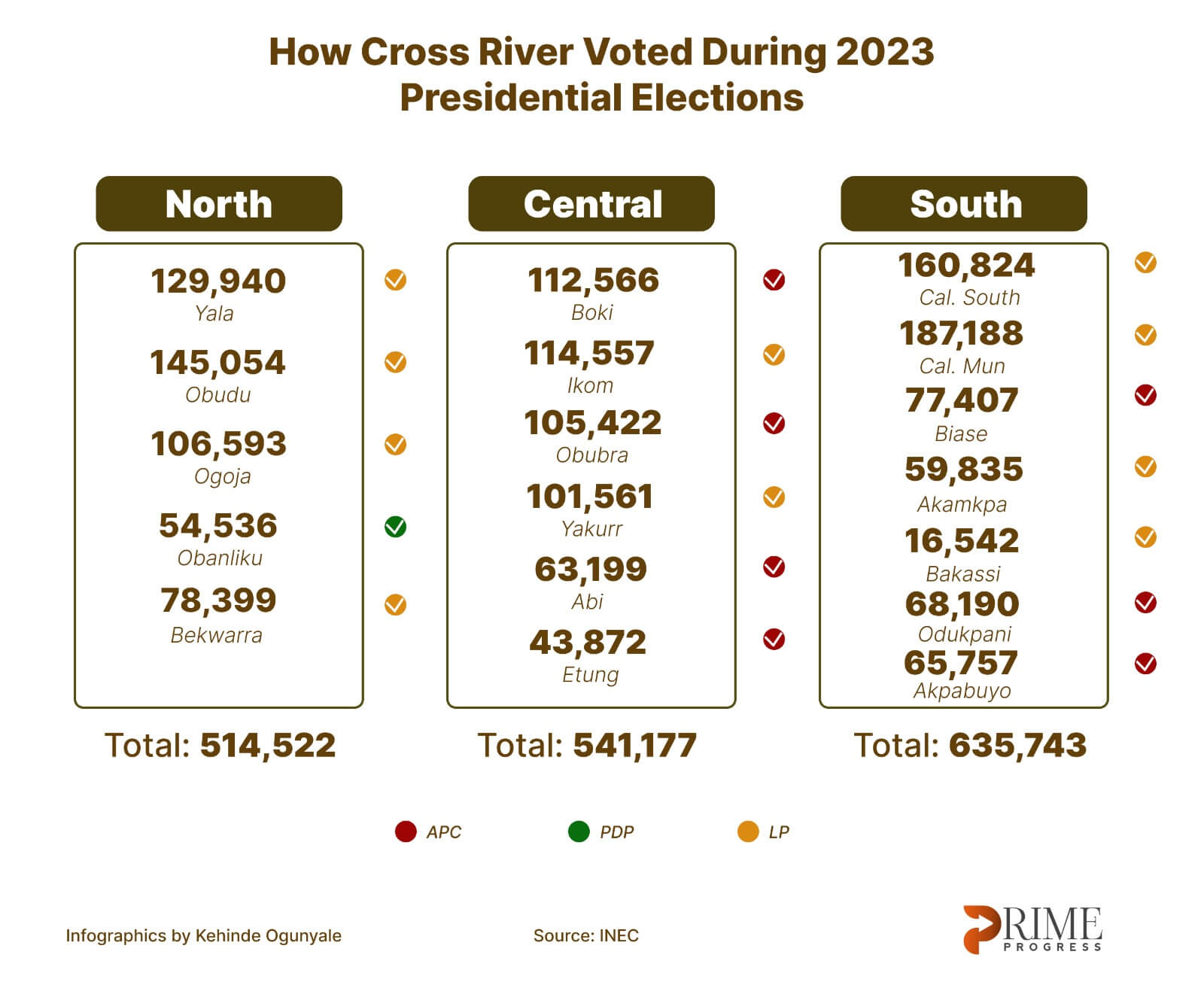As voters once again prepare to head to the polls on March 18 to choose their governors and state house of assembly members, there are probably only a few places in Nigeria where the elections are too close.
Cross River State is a case in point.
The people’s paradise has a history of always queuing behind the People’s Democratic Party or PDP. The party has won all governorship elections in the state since 1999, earning itself the title of a core PDP state, but this was until internal party politics chased incumbent Governor Ben Ayade to the All Progressive Congress or APC, in 2021.
The party’s refusal to zone its governorship ticket to the southern part of the state also seemed to have alienated it from voters in the district.
The back-to-south movement
Built and anchored on rotational governorship, proponents of the back-to-south movement argue that there is a “gentleman’s agreement” that the seat of power would be rotated between the three senatorial zones.
These persons posit that Donald Duke, elected in 1999 and held power until 2007, held the torch for the southern senatorial district (consisting of Calabar South, Calabar Municipality, Akpabuyo, Odukpani, Bakassi, Akamkpa, and Biase local government areas of LGAs); Liyel Imoke (2007-2015), represented the central senatorial district (made up of Ikom, Yakurr, Obubra, Boki, Etung, and Abi LGAs). Ben Ayade, retiring from the Peregrino House in May this year, took the turn of the northern district (comprising Yala, Ogoja, Obanliku, Obudu, and Bekwarra LGAs).
Proponents of the movement argue that the three senatorial districts have had their turns at the number one seat in the state; therefore, it should return to the south, where it will start another journey up north. This, they insist, is the equitable thing to do.
They are two sets of opposition to the above argument. The first says they believe in zoning but that since the three senatorial districts have had their stay in the governor’s office, it is only fair that the contest is thrown open and any district that wins becomes the first in the new zoning formula.
The second opponents to the zoning claim say the state has never practised zoning. They insist that all elections in the state, from primary elections to the major polls, have been keenly contested by persons from different senatorial districts. They say the PDP’s decision to have thrown its governorship primary open was correct and in that line.
The front-liners
Even as the Labour Party won the state in last month’s presidential polls, the charge toward the Cross River Government House is still a two-horse race between the APC and the PDP.
Flying the flag for the APC, who are championing the back-to-south movement, is Prince Bassey Otu, a former member of the House of Representatives and a one-term senator representing the central senatorial district.
Otu, from Odukpani, clinched the party’s ticket after beating two candidates – John Owan-Enoh and Chris Agara-from the central senatorial district in the primary elections of May 27, 2022, within the main bowl of the UJ Esuene Stadium in Calabar.
Since then, Otu has had to fight legal battles within and outside his party. Owan-Enoh had challenged Otu’s emergence at the primaries, alleging the former banker did not possess the academic qualifications to vie for the post of governor.
He withdrew the case after the intervention of the then-APC presidential candidate, Ahmed Bola Tinubu. Otu also brushed off a legal battle from the PDP, which had alleged that Otu’s running mate is a British citizen and, therefore, their candidacy should be nullified.
Otu’s candidacy is seen as being stained by Ayade’s endorsement. His opponents argue that his administration will continue Ayade’s government under another name. That argument is sustained by the number of Ayade’s aides who have moved their office into Prince Otu’s campaign.
Flying the flag of the PDP is Sandy Onor, the senator representing the central senatorial district at the National Assembly. Onor, who started his political career as the chairman of Etung Local Government Area, rose to become a commissioner and now a senator.
Onor’s links to Nyesom Wike are well publicized, with many believing that the Rivers State Governor is bankrolling his ambition.
What do the February 25 elections say?
While the February 25 polls have come and gone, the results of the parliamentary elections might hold a few lessons and show the direction towards sentiments in the state’s governorship elections.
The PDP’s performance, especially in the southern part of the state, is seen by many as a referendum on their decision to pick a candidate outside the zone.
The party lost the senatorial seat to a political green-horn and a former commissioner of finance in the state, Asuquo Ekpeyong. The party also did abysmally in the House of Representatives election, losing three seats it had won in 2019 to the APC.
In the central senatorial district where the governorship candidate is from, the PDP lost all three available House of Representatives seats. Eteng Jones Williams, the Speaker of the State House of Assembly, will replace the party’s governorship candidate at the Senate.
However, in the north, where the governor is from, PDP snatched victory from the jaws of defeat. The party retained its senatorial district seat by defeating Governor Ben Ayade and took the two available House of Representatives seats from two sitting House of Representatives members of the APC.
Some say the party’s performance in that district should be attributed to the popularity of Senator Jarigbe Agom Jarigbe. But Jarigbe himself has more often than necessary expressed his support for the candidacy of Sandy Onor.
Last-lap
As last-minute political alignment and realignment happen in the state, it is left to see how Onor gathers support from a senatorial district with the highest number of voters in the state and thinks it owns the right to the governorship seat.
If he fails to unite the south and his party fails to consolidate on some of the grounds they have gained in the north, the back-to-south chanters will be singing victory songs on the morning of Sunday, March 19, a day after the governorship election.
As voters in Nigeria prepare for governor and state house elections on March 18, Cross River State stands out for its competitive race. Historically, the People's Democratic Party (PDP) dominated the state, but internal conflicts pushed Governor Ben Ayade to the All Progressive Congress (APC) in 2021. The "back-to-south" movement, advocating for the governorship to return to the southern senatorial district, has become a focal point, with divided opinions on zoning practices.
The main contenders are Prince Bassey Otu of APC, supported by the "back-to-south" movement, and Sandy Onor of PDP. Despite the Labour Party's win in the presidential election, the local governance race remains tight between APC and PDP. The February 25 elections indicated shifting voter sentiments, showing PDP's weakened performance in key areas except for the northern district, where they retained some influence.
The upcoming elections will ultimately test whether Onor can garner enough support to counter the APC's momentum and whether the "back-to-south" advocates will celebrate victory.





